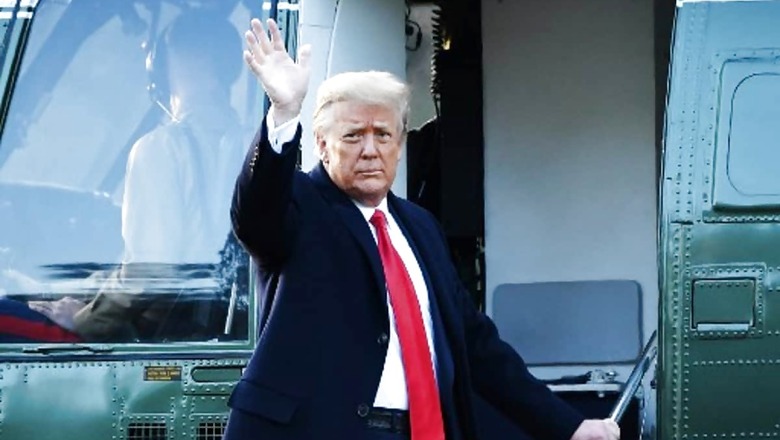
views
The second Senate impeachment trial of former President Donald Trump is scheduled to kick off Tuesday with some of the key questions about the trial itself — including how long it will go and whether any witnesses will be called — still unanswered.
The ultimate outcome of the trial does not appear to be in doubt: Trump will be acquitted by the Senate for the second time, falling well short of the two-thirds votes needed for conviction.
But that doesn’t mean the next week — and possibly two — will be without drama as the House impeachment managers recount the destruction caused in the deadly January 6 riot and argue that Trump was the one who incited the insurrectionists to ransack the US Capitol.
House Democrats on Thursday sought testimony from Trump himself at the trial, a move that was swiftly rejected by Trump’s legal team. Democrats are unlikely to subpoena the former President and risk a drawn-out legal battle, feeling they can make their case that he incited the rioters without his testimony, just as they swiftly impeached him for “incitement of insurrection” one week after the January 6 riots.
But the Democrats’ brief trial balloon that Trump should testify underscores the logistical hurdles that Senate Majority Leader Chuck Schumer and Senate Minority Leader Mitch McConnell still have to navigate for the first step of the trial: its rules.
Senate wants a speedy trial
Schumer and McConnell and their aides have been engaged in extensive discussions about the trial’s organizing resolution, which the Senate will pass before arguments begin. Unlike last year’s trial, both sides hope to reach a bipartisan agreement on the trial’s parameters, which will include how long the impeachment managers and defense team get to make their arguments, how witnesses could be called and other matters.
There’s reason for bipartisan optimism in the Senate — when it comes to logistics at least — because both sides are seeking a speedy trial. While the House impeachment managers are eyeing a proceeding that could last up to two weeks, some Senate Democrats are pushing for a quicker time frame.
The reason is simple. Senate Democrats are diving into their effort to pass President Joe Biden’s $1.9 trillion stimulus plan, a high-wire act that will require every Senate Democrat to stay on board. Plus, Biden still has a slate of nominees that needs to get confirmed by the Senate. And none of that can happen on the floor until the trial is done.
While Republicans are in no rush to confirm Biden’s Cabinet, they also don’t have a desire for the public to remain fixated on the events of January 6 — and on the former President — in a lengthy trial.
The expectation on all sides is that Trump’s second impeachment trial will be shorter than the first, which lasted three weeks. Just how much shorter is still being negotiated.
Schumer’s office said Saturday night that the Senate will accommodate a request from one of Trump’s impeachment attorneys, David Schoen, to halt the trial during the Jewish Sabbath.
This would mean the trial would be suspended at sundown Friday and potentially not reconvene until Sunday.
“We respect their request and of course will accommodate it. Conversations with the relevant parties about the structure of the trial continue,” said Justin Goodman, a spokesman for Schumer.
There would need to be an agreement among senators to hold the trial on a Sunday. The New York Times first reported on the development.
As the Senate president pro tempore — the longest-serving senator of the majority party — Sen. Patrick Leahy, a Vermont Democrat, is presiding over Trump’s impeachment trial in lieu of Chief Justice John Roberts. Roberts, who oversaw Trump’s first impeachment trial, chose not to oversee the proceedings — because Trump is no longer in office, Schumer has said.
GOP senators preview trial vote
When Sen. Rand Paul forced a vote on the constitutionality of Trump’s impeachment trial last month — arguing it was unconstitutional to convict a former President — only five Republicans joined all the Democrats to kill the Kentucky Republican’s motion.
It was a telling vote since Democrats will need at least 17 Republican senators to vote to convict Trump and bar him from running for future office.
Many Democrats and Republicans alike have pointed to the vote on Paul’s point of order as an indicator for how the trial’s final vote will likely land. And Senate Republican leader Mitch McConnell sided with Paul in the vote — suggesting his initial signals that he might be open to convicting Trump are not likely to result in him voting that way.
Trump’s defense team will likely use this exact argument next week to defend the former President.
In a 14-page response to the House’s impeachment effort on Tuesday, Trump’s lawyers, Bruce Castor and David Schoen, previewed their argument that the Senate cannot vote to impeach Trump when he no longer holds office, as well as that Trump’s speech about the election and before the January 6 riots did not cause the riots and was protected by the First Amendment.
“The constitutional provision requires that a person actually hold office to be impeached. Since the 45th President is no longer ‘President,’ the clause ‘shall be removed from Office on Impeachment for …’ is impossible for the Senate to accomplish,” Trump’s team wrote.
The House impeachment managers pushed back on that point, writing there is precedent to hold a trial and convict Trump, who was impeached by the House last month while he was still in office.
“There is no ‘January Exception’ to impeachment or any other provision of the Constitution,” the managers wrote. “A president must answer comprehensively for his conduct in office from his first day in office through his last.”
‘A Senate of courage or cowardice’
The House impeachment managers haven’t made a final decision on whether they will call witnesses for the trial. They’re preparing for the possibility they won’t have any witnesses — but they may decide to use them if they find a witness willing to voluntarily step forward, according to sources.
The managers want to avoid any kind of court fight over witnesses like the House had to deal with during the first impeachment of Trump, which would delay the trial further.
Even without witnesses, Democrats are preparing to use evidence from video and social media to help illustrate how Trump’s words, actions and tweets incited the rioters to attack the Capitol.
The trial is sure to be compelling. While Republicans are relying on a procedural argument as reason to dismiss the impeachment charge against Trump — avoiding a judgment on his conduct — the House’s presentation will catapult senators — and the public — back to the harrowing events of January 6 when senators were forced to flee the chamber.
For Democrats, the trial is likely to be as much about holding Trump and the Republican lawmakers who pushed his false claims of election fraud accountable in the public eye than it is the all-but-impossible task of flipping 17 Republican votes.
“In the court of the Senate, they will make their case. And in the court of public opinion, they will make their case,” House Speaker Nancy Pelosi said at her weekly news conference Thursday.
“And for history and posterity, as our founders said, to ourselves and our posterity, they will make the case. But I have great confidence in them, and we’ll see. We’ll see if it’s going to be a Senate of courage or cowardice.”
Read all the Latest News, Breaking News and Coronavirus News here













Comments
0 comment